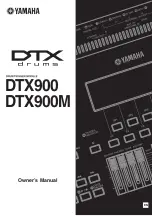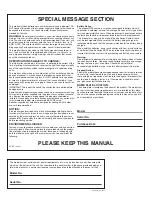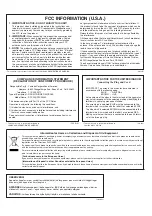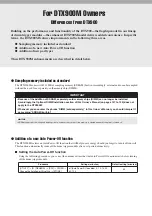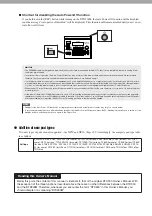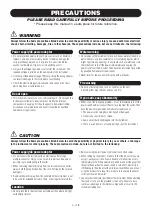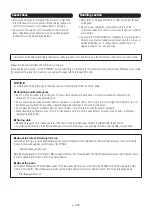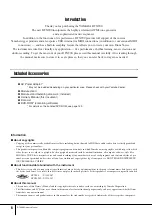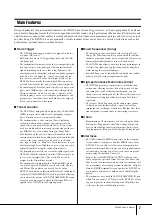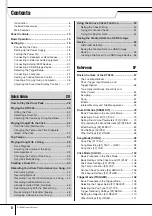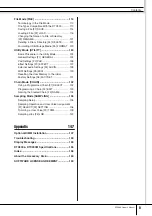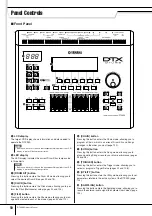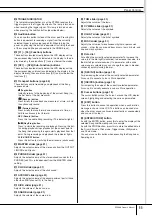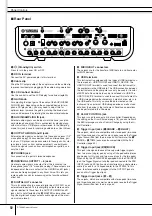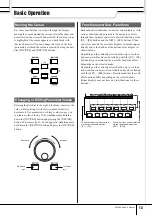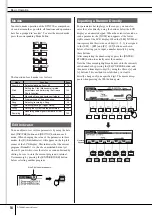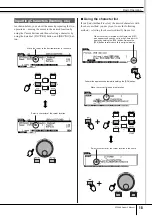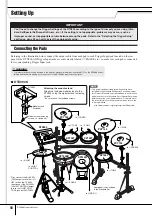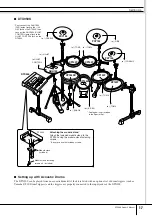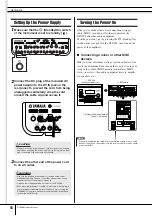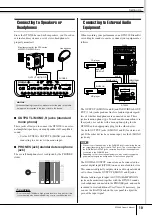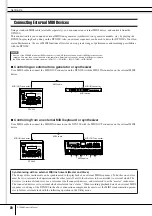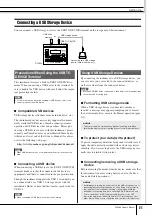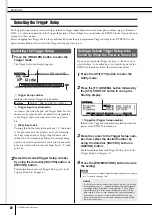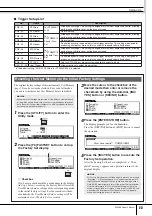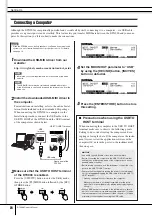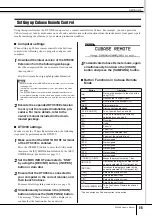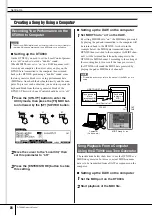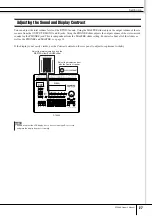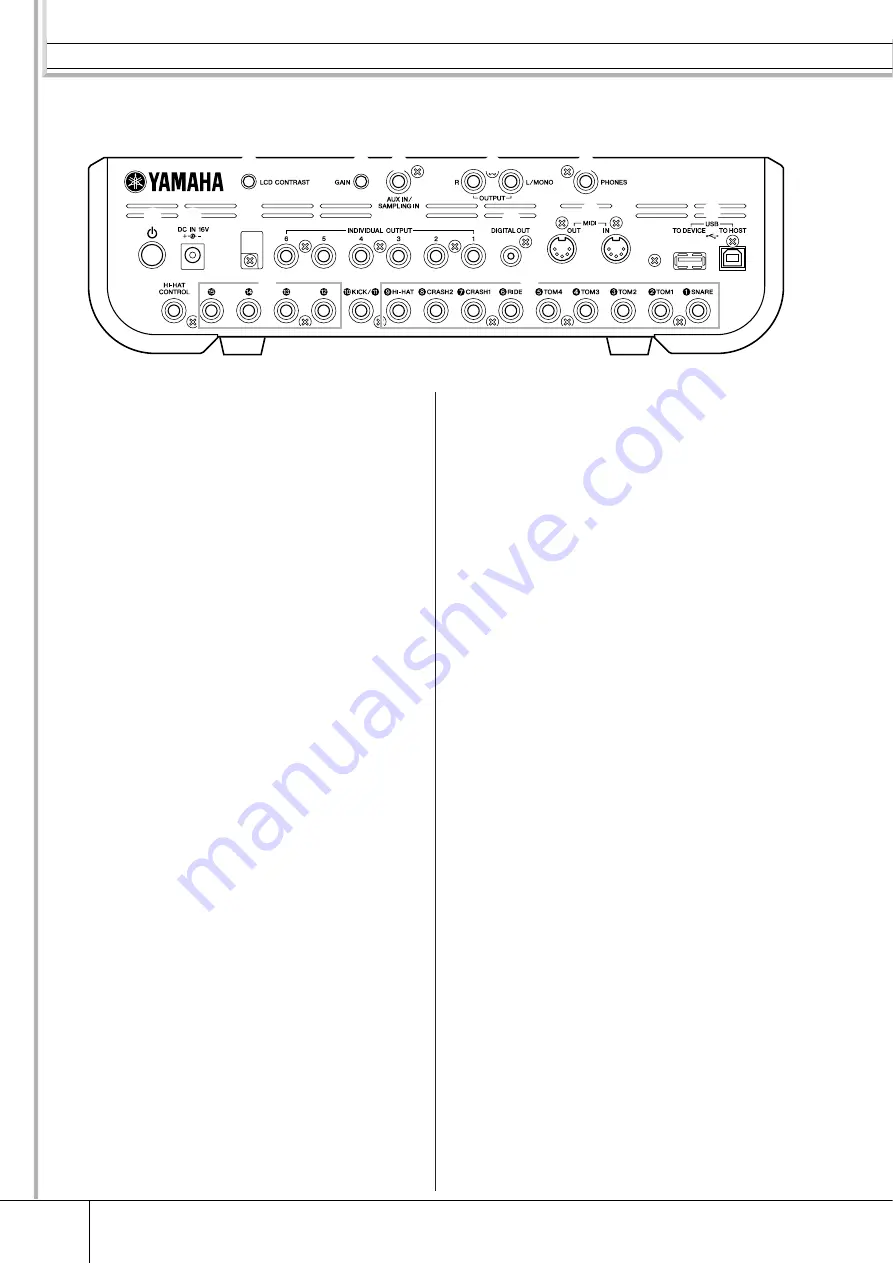
Panel Controls
12
DTX900 Owner’s Manual
■
Rear Panel
q
F
(Standby/On) switch
Press to turn the power ON or OFF.
w
DC IN terminal
Connect the AC power adaptor to this terminal.
e
Cable clip
Wrap the DC output cable of the adaptor around the cable clip
to prevent accidental unplugging of the cable during operation.
r
LCD Contrast Control
Use this control to set the LCD display for optimum legibility.
t
GAIN knob
For adjusting the input gain of the audio at the AUX IN/SAM-
PLING IN jack. Depending on the connected device (micro-
phone, CD player, etc.), you may need to adjust this for
optimum level. Increase the gain by rotating the knob clock-
wise, and decrease it by rotating the knob counter-clockwise.
y
AUX IN/SAMPLING IN jack
External audio signals can be input via this phone jack (stan-
dard stereo phone plug). This is convenient for playing along
with music from a CD player or other device. In the Sampling
mode, this jack is used for capturing audio data as User Voices.
u
OUTPUT L/MONO and R jacks
External audio signals can be input via these phone jacks (1/4"
mono phone plug). Various devices such as microphone, gui-
tar, bass, CD player, can be connected to these jacks. For ste-
reo signals (such as from audio equipment), use both jacks.
For mono signals (such as from a microphone or guitar), use
only the L jack.
i
PHONES jack
For connection to a pair of stereo headphones.
o
INDIVIDUAL OUTPUT 1 – 6 jacks
Line level audio signals are output from this instrument via
these phone jacks (1/4" mono phone plug). These outputs are
independent of the main output (at the L/MONO and R jacks),
and can be freely assigned to any Drum Voice. This lets you
route specific sounds for processing with a favorite outboard
effect unit.
!0
DIGITAL OUT connector
This is for connecting to a coaxial digital input (S/P DIF) on an
external audio device. This jack digitally outputs stereo audio
signals identical to those from the OUTPUT L/MONO and R
jacks, but is not affected by the
!6
MASTER volume slider set-
ting (the digital jack always outputs audio signals at the maxi-
mum volume level).
!1
MIDI IN/OUT connectors
These jacks are for the transfer of MIDI data to and from exter-
nal MIDI devices.
!2
USB terminals
This instrument is equipped with two types of USB terminals on
the rear panel – USB TO HOST and USB TO DEVICE. The
USB TO HOST terminal is used to connect this instrument to
the computer via the USB cable. The USB connection between
the instrument and the computer can only be used for transfer
of MIDI data. No audio data can be transferred via USB. The
USB TO DEVICE terminal is used to connect this instrument to
a USB storage device (flash memory, hard disk drive, etc.) via
the USB cable. This lets you save the data created on this
instrument to an external USB storage device as well as load
data from the device to the instrument. Save/Load operations
can be performed in the File mode.
!3
HI-HAT CONTROL jack
This jack is used to connect a hi-hat controller. Depending on
the setting on the Drum Kit mode (page 78), you can transmit
the MIDI messages such as Control Change by using the Hi-
Hat Controller.
!4
Trigger Input jacks (
q
SNARE –
o
HI-HAT)
These jacks, which are compatible with stereo pads (two-zone
and three-zone pads) as well as mono pads, receive the Trigger
Signal transmitted from the drum pads. Furthermore, the
q
SNARE –
t
TOM4 jacks are also compatible with the Pad
Controller (page 59).
!5
Trigger Input jack (
!0
/
!1
KICK)
This jack is designed to accept two separate trigger signals
from two mono (single) pad by using a Y-shaped cable (stereo
phone plug for this jack and two mono plugs for the two pads).
When using the KP125W/KP65 equipped with the PAD INPUT
jack, the Trigger Signals of another pad connected to the PAD
INPUT jack and KP itself can be transferred via a single stereo
cable (no need for a Y-shaped cable) to the DTX900. In this
case, the stereo cable is plugged into the OUTPUT jack of a
pad and this Trigger Input jack.
!6
Trigger Input jacks (
!2
–
!5
)
These jacks, which are compatible with stereo pads (two-zone
and three-zone pads) as well as mono pads, receive the Trigger
Signal transmitted from the drum pads.
w
q
e
t
y
u
i
r
o
!0
!1
!2
!5
!3
!6
!4

